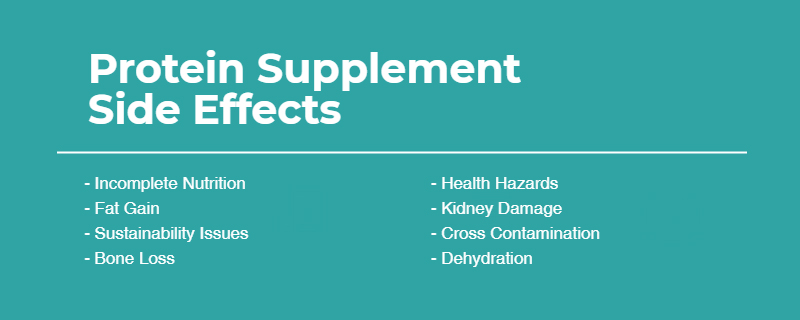
Are Protein Supplements Safe and Good for Health?
Perfectly toned bodies, six-pack abs, and excellent build-up is a dream that manifests in each one's mind today. Gymnasiums are thriving with trainers and health conscious freaks. Amidst all the efforts of staying fit and maintaining a healthy body, there is one thing that has caught pace too, wondering what? It is none other than Protein Supplements like protein powders and protein shakes.
Do you know what precisely these protein supplements are? How are they made? What are the pros and cons of having them? And are protein supplements safe and suitable for health?
The safety and benefits of protein powders are debatable. But, one should remember that you cannot buy a body out of a bottle. Any supplement would prove beneficial, only when accompanied by a proper exercise routine and a balanced diet.
To conclude, both pros and cons of protein supplements must be evaluated. So, let’s start by addressing the most fundamental question –
What is a Protein Supplement?
A protein supplement can be defined as a powder that is consumed for adding a specific dietary protein to the diet when it is not consumed in the form of food. Made up of milk, rice, pea or hemp, it is seen as a meal replacement.
Different proteins are used for various purposes. For instance, proteins consumed for weight loss are different from the ones consumed for weight gain.
How Much Protein Does a Human Body Require?
The DRI (Dietary Reference Intake) is 0.8 grams of protein/kg of body weight or 0.36 grams/ pound, i.e., 56 grams/day for the average man and 46 grams/day for the average woman.

Advantages of Protein Supplements
Triggers weight loss: Journal of the American College of Nutrition, Vol. 21, No. 1, 55-61 2002 published that specific studies and research indicate that protein supplements increase fat burning process or postmeal thermogenesis.
Protein powders are great for post-workout recovery and anabolism.
Protects lean muscle mass: A report published in Curr Opin Clin Nutr Metab Care. 2003 Nov;6(6):635-8 cited that protein consumption in the form of supplements resulted in a lower body weight regain after weight loss, due to body composition, satiety, thermogenesis, and energy inefficiency, while the metabolic profile improves.
Protein powders stimulate protein synthesis which is necessary for muscle growth.
Suppresses tumor growth: This is a characteristic of milk-based proteins, like whey protein, and milk and casein.
Whey proteins can trigger an insulin response, which is a critical factor for muscle growth.
Protein powders can be anti-catabolic: Casein, a milk-derived protein, has anti-catabolic properties, i.e., it reduces muscle protein breakdown.
Casein protein powders have peptides that are potent in reducing blood pressure and stimulating the immune system.
Whey protein is a precursor to glutathione – the body’s master antioxidant. Because, it is useful in degenerative diseases associated with a glutathione deficiency, like Alzheimer’s and Parkinson’s disease, various cancers, suppressed the immune response, asthma, HIV, chronic fatigue and much more.

Disadvantages of Protein Supplements
Incomplete Nutrition: Protein supplements are heavy in protein. They are incompetent in providing an adequate amount of carbohydrates, vitamins, minerals and healthy fats. Even if commercially fortified protein won’t offer the same kind or level of nutrition as whole foods.
Fat gain: Body stores excessive protein powder in the form of fats. Thus high protein intake without an increase in physical activity would result in an equal gain in both fat and muscle.
Sustainability Issues: Well renowned nutritionist and dietitian, Katherine Zeratsky acknowledges that using protein supplements for weight loss strategy, prove less viable when used for the long term. You might develop nutrient deficiencies or regain the weight when you return to your previous eating habits.
Bone loss: High levels of protein generates a significant amount of acid due to the excess sulfates and phosphates. The kidneys try to strike a balance by excreting more acid, and the skeleton releases calcium which is lost in the urine as a buffer.
This leaches out calcium from bones which increases the risk of osteoporosis. One could counter this effect by maintaining a diet high in alkaline fruit and vegetables in addition to protein supplement.
Health Hazards: According to the Centers for Disease Control and Prevention, extremely high protein requirement can lead to weight gain, high blood cholesterol, the risk of cardiovascular diseases and kidney complications. The Physicians Committee for Responsible Medicine cited that most Americans consume double the protein prescribed for the body and increase the risk of cancer, osteoporosis and kidney stones.
Kidney damage: High protein diet strains the kidneys due to ketones that are generated by such a diet and the need to sweat these products. People with reduced kidney function can face numerous health issues due to this.
Cross Contamination: Consumer Reports issue of July 2010 issue conducted a study on protein supplements. After analyzing 15 different brands, they found that the supplements were contaminated by arsenic, cadmium, lead or mercury. These ingredients when consumed in excess can render the body toxic.
Dehydration: A high protein intake, without ample of carbohydrates, can push the body into ketosis, a state in which toxic ketones build-up in the body. The kidneys try hard to eliminate these substances and lose a lot of water as urine. This increases the risk of dehydration. In this process, not only the kidneys are harmed, but the heart is affected too.
What’s your take on this topic? Do let us know in the comments section below.
Nutraways supplements are good for health order it from vitasave just like me.